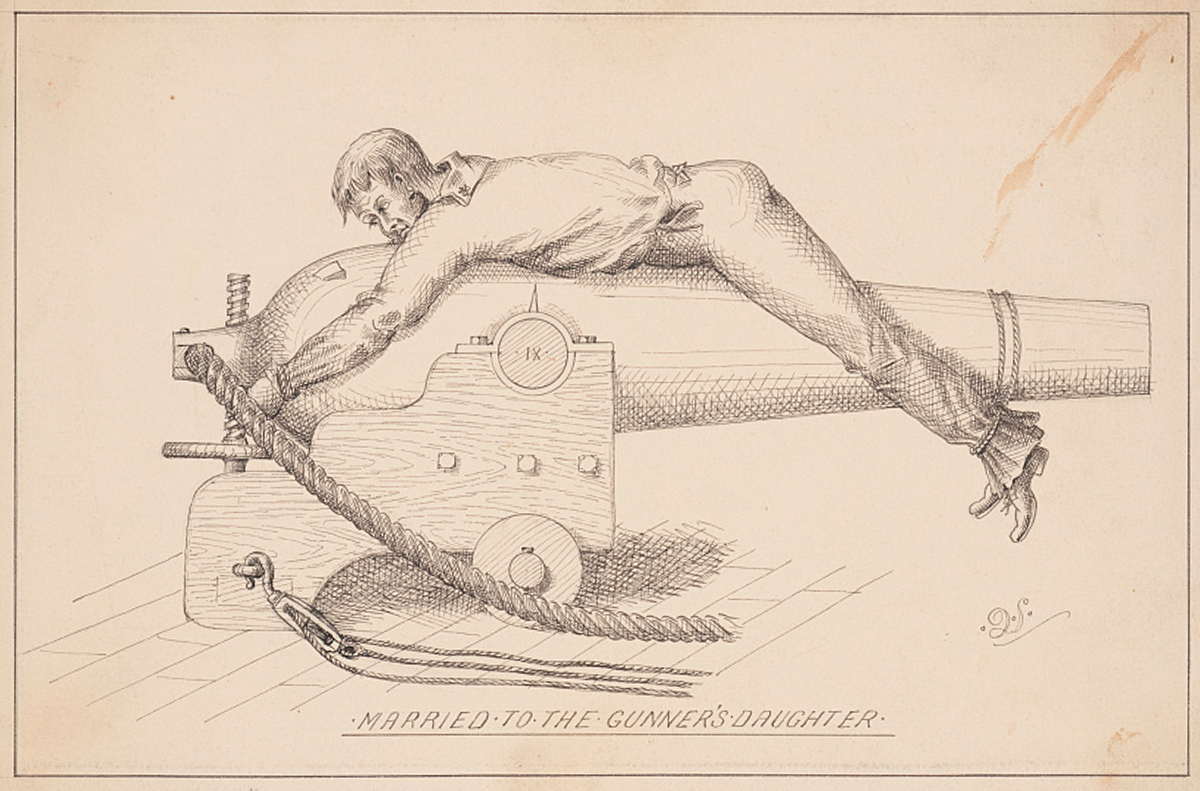Jackspeak: Over a Barrel
By Lookout Production on Feb 03, 2023 with Comments 0
To be over a barrel means to be in a tricky situation or at a disadvantage compared to another person. The phrase is commonly used today and has two derivations related to the maritime environment. The first alludes to an old practice of reviving a drowning victim by placing the casualty over a barrel and rolling it back and forth to empty the lungs of water. While the act describes the term, it does not explain being at a disadvantage as much as the second explanation. That one describes a sailor draped over a cannon barrel and ready to receive punishment, also known as kissing (or marrying) the gunner’s daughter. It was not a happy event as the gunner’s daughter was a gun barrel, and the marriage ceremony was a flogging. In today’s navy, a sailor might also be referred to as kissing the gunner’s daughter when he prepares to undergo a service tribunal.
When the accused was said to have a date with the Captain’s daughter, it meant the sailor would receive corporal punishment such as flogging, usually with a cat o’ nine tails – a short, nine-tailed whip kept by the bosun’s mate. Loose folklore states the ‘cat’ was held in a baize bag, which is a possible origin for the phrase ‘let the cat out of the bag’, although this has been widely refuted. The phrase ‘not enough room to swing a cat’ may also have been derived from flogging as it describes the desire to punish transgressors on the upper deck since there was not enough room to swing a cat below the decks.
Today, flogging is a generic term for a variety of military punishments, as (thankfully) corporal punishment is now a thing of the past, e.g., “Bloggins is adrift. Surely, there’ll be a flogging.” Flogging around the fleet describes a punishment done for optics. It derives from the historical practice of strapping a guilty party to a boat that toured the entire fleet while the defaulter was flogged. This punishment was reserved for serious crimes such as desertion or striking an officer.
The oft-used phrase ‘no names, no pack drill’ means to say nothing and avoid repercussions, i.e., “Just clean up the mess and carry on. No names, no pack drill”. The term derives from the British Army, where unruly soldiers were punished with ‘pack drill’, which was training in full uniform and a heavy pack. In some cases, ‘no names, no pack drill’ hints that the names of transgressors could be kept quiet to spare them from an awful punishment.
Finally, the commonly used phrase being in the black books usually means an officer or sailor is in trouble or has fallen out of favour and may be deliberately passed over for advancement. Some say this term is derived from the Black Book of the Admiralty, which contained a list of officers deemed guilty of poor conduct.
You will find over 4,000 examples of Jackspeak in my book Jackspeak of the Royal Canadian
Navy (2nd ed.).
The author of ‘Jackspeak of the Royal Canadian Navy’ and ‘Whiskey 601’, Mark Nelson developed a love of the Navy’s language and lifestyle over his 26-year career in the service. After retiring as a Chief Petty Officer Second Class, he now works as a Library Systems Specialist at Red River College Polytechnic in Winnipeg, Man.
Follow Mark on Twitter @4marknelson
Filed Under: Top Stories
About the Author:






